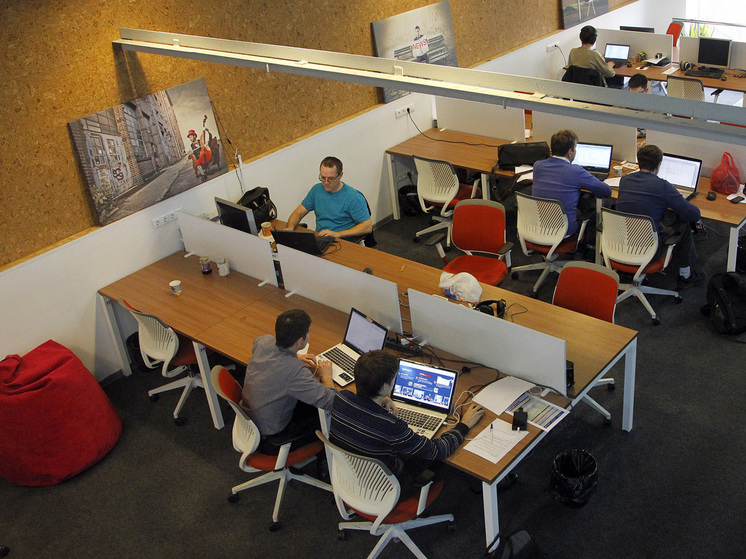Office tenants wanted comfort “like Google”
There is an acute shortage of coworking spaces in Moscow. There is a shortage of not only spaces where anyone can rent a workplace for a couple of hours, but also service (flexible) offices, which large and medium-sized companies love to accommodate a large number of employees. The vacancy rate fell to 7.9%, the lowest level in two years. What is the reason for the unusual boom?

As Ekaterina Belova, head of the office space department at IBC Real Estate, told MK, the peak level of vacancies in Moscow service offices was recorded at the beginning of 2023, when 26.3% of network spaces on the market remained empty. However, at the end of the first quarter of 2024, this figure dropped to 7.9%. Thus, in just one year, the share of available jobs fell by almost 20 percentage points. — from 26.3% to 7.9%.
According to her, the current high level of activity in the service office segment reflects the situation in the office market as a whole: 2023 was a record year for demand — about 2 million square meters were rented and purchased. m. Russian companies developed rapidly after the departure of foreigners, and they needed ready-made offices here and now. First of all, we sorted out offices with finishing (preferably new), equipped with furniture and equipment, into which you can immediately move in.
According to the director, head of the owner services department of CORE.XP, Kirill Babichenko, 8,357 sq. m. opened in the capital in January–March. m of new flexible spaces (1,300 workplaces). However, the market quickly swallowed these volumes. “The shortage of furnished offices within the classical lease stimulated the demand for flexible offices,” the expert noted.
Among operators of flexible spaces, the most in demand are business districts within the Third Transport Ring: Presnensky district (20% of open areas), Tverskoy (13%), Danilovsky (10%). “In general, about 32% of the sites are located within the Central Business District, 20% between the Central Business District and the Third Transport Ring, another 10% in Moscow City,” Babichenko said.
“Today there is a sharing economy (sharing economy. — MK), incl. in the field of workspaces (coworking spaces and smart offices), is experiencing a boom both in Moscow and in the regions,” explained managing partner of the SOK smart office network Irek Allayarov. In his opinion, the reasons for such popularity are quite predictable. Firstly, choosing flexible workspaces is very beneficial from an economic point of view. This approach allows all the team’s resources to be directed to target indicators, and not to maintaining the workspace. Secondly, coworking spaces help reduce risks: simple exit and entry from the contract, the possibility of short-term rental, etc.
Along with the popularity, the quality of the product also grows,” says Allayarov. According to him, the approach to organizing the workplace has changed: professional training of specialists has appeared on the basis of universities, PropTech is actively developing, which allows for rapid improvement of workplace management, communication with tenants, and community work. Thus, smart offices are becoming a kind of trendsetters (fashion setters — “MK”) in the field of workspace organization. “With the right approach, the tenant has the opportunity to work in an office that was previously available only to employees of large corporations such as Google or Apple, which have various spaces: standard places for work and relaxation, terraces, coffee points, etc. And all this is based on good engineering solutions,” says Allayarov.
Today, companies from the IT and logistics sectors, as well as financial departments of corporations and state-owned companies, are more willing than others to move to flexible offices. Increasingly, you can meet representatives of creative professions in smart offices. This year, the share of thematic coworking spaces has increased: beauty, medicine, workshops, etc.
The average term for concluding transactions is from 1 to 3 years. The cost depends on the level of the site, the service provided and the included services. “The average rental rate in a service office in Moscow is 30.6 thousand rubles per month for one workplace,” said Ekaterina Belova. According to her, a new offer with a total area of 48,000 sq. m. is expected to appear on the market in the near future. m (6,700 jobs). “The volume of operating flexible offices by the end of December 2024 may reach 434,956 sq. m. m (69 thousand seats),” Babichenko added. He does not expect a significant increase in rental rates for flexible offices: tenants may not be willing to pay for increased rates and will prefer traditional forms of rent.


